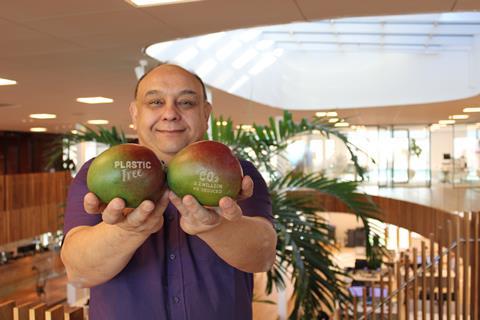Group says it has “initiated a European trend” with the introduction of laser marks on fruit and vegetables
Dutch group Eosta has said that its laser branding of organic fresh produce has now saved the rquivalent of 50m pieces of plastic packaging.

In late 2016, Eosta – under its brand name Nature & More – introduced the application of a laser technique to brand organic fruit and vegetables as a way of avoiding the use of stickers and packaging in supermarkets.
Natural branding involves marking fruit and vegetables using laser light, a process which requires the removal of a minor amount of pigment from the outer layer of the skin or peel.
Currently, LaserFood (Spain) and EcoMark (Germany) are the main European providers of laser technology for branding fruit and vegetables.
”This method saves plastic and paper and huge amounts of energy and emissions: a laser mark requires a mere fraction of the energy required for a sticker,” Eosta explained.
“Using natural branding, Eosta has managed to save 50m pieces of plastic packaging, which corresponds to 500,000kg of plastic, 216,000 square metres of paper, and an energy saving of 2.2m kg of CO2 emissions, equalling 19m kilometres driven by car. In 2018, Eosta received the Sustainable Food Award for this innovative packaging method.”
Eosta noted that natural branding was mostly applied to ginger, avocadoes, mangoes and sweet potatoes, in addition to cucumbers, kiwifruit and other products, while it is also investigating methods to brand citrus and other fruit varieties.
”Consumers are extremely enthusiastic about this: most conscious consumers feel frustrated when seeing the huge amounts of plastic used to package organic fruit and vegetables,” it continued. ”Other supermarkets and wholesalers have also decided to purchase machines to brand their products.”
The group said that from the very start, Paul Hendriks, Eosta packaging manager, and packaging expert Gerben Borsje had been the ”moving spirit” behind the natural branding technology.
”The most sustainable packaging is the absence of packaging, and for organic products, this is achieved using natural branding,” Hendriks outlined. ”Studies show that consumers are very happy about this, because they naturally prefer buying their organic products free from plastic packaging.”



